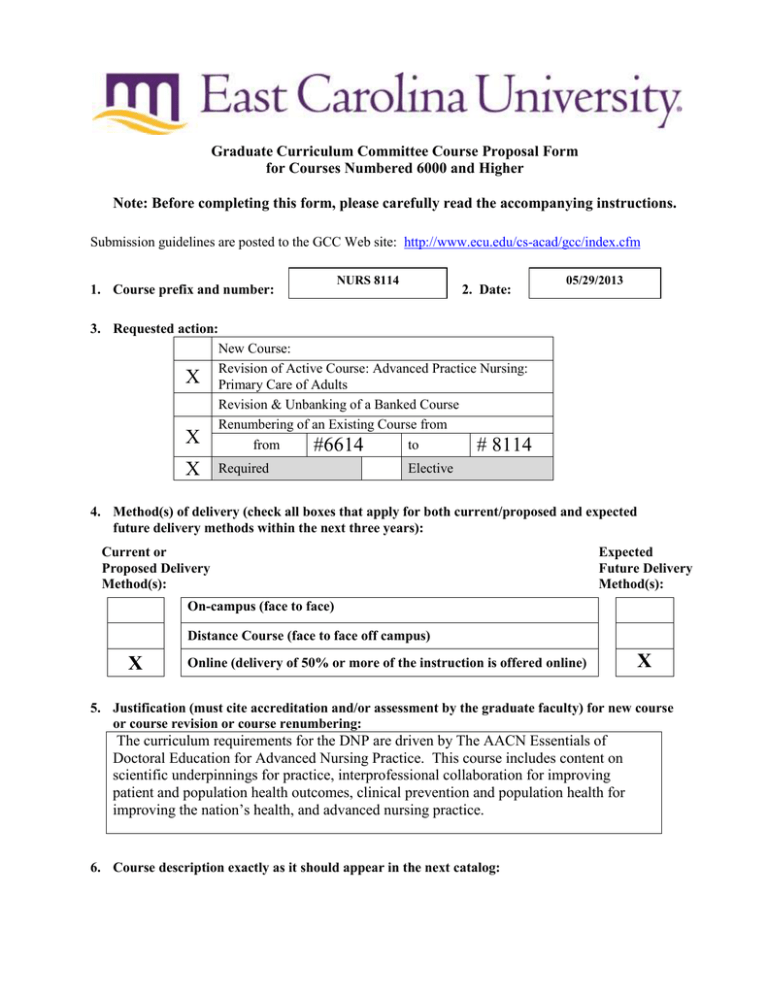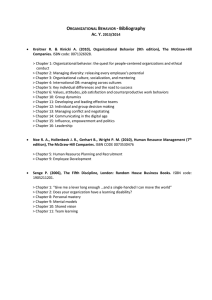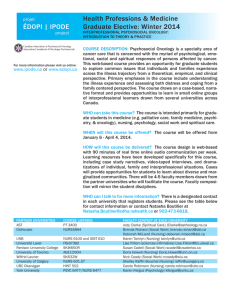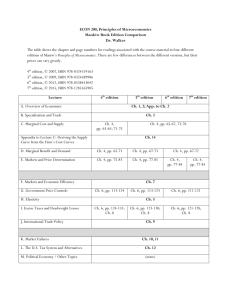NURS 8114
advertisement

Graduate Curriculum Committee Course Proposal Form for Courses Numbered 6000 and Higher Note: Before completing this form, please carefully read the accompanying instructions. Submission guidelines are posted to the GCC Web site: http://www.ecu.edu/cs-acad/gcc/index.cfm 1. Course prefix and number: NURS 8114 2. Date: 05/29/2013 3. Requested action: New Course: of Active Course: Advanced Practice Nursing: X Revision Primary Care of Adults Revision & Unbanking of a Banked Course Renumbering of an Existing Course from X from to #6614 # 8114 X Required Elective 4. Method(s) of delivery (check all boxes that apply for both current/proposed and expected future delivery methods within the next three years): Current or Proposed Delivery Method(s): Expected Future Delivery Method(s): On-campus (face to face) Distance Course (face to face off campus) X Online (delivery of 50% or more of the instruction is offered online) X 5. Justification (must cite accreditation and/or assessment by the graduate faculty) for new course or course revision or course renumbering: The curriculum requirements for the DNP are driven by The AACN Essentials of Doctoral Education for Advanced Nursing Practice. This course includes content on scientific underpinnings for practice, interprofessional collaboration for improving patient and population health outcomes, clinical prevention and population health for improving the nation’s health, and advanced nursing practice. 6. Course description exactly as it should appear in the next catalog: NURS 8114 - Advanced Practice Nursing: Primary Care of Adults 4 Formerly NURS 6614 P: Admission to BSN-DNP program AGPCNP or FNP option; NURS 6050, 6610, 6611, or consent of program director. Theoretical, scientific, and contemporary knowledge base to provide a framework for assessment and management of primary health care needs of adults, including culturally diverse urban and rural families. 7. If this is a course revision, briefly describe the requested change: Revisions in course number, title, objectives, and topical outline to meet the BSN to DNP program essentials. 8. Course credit: Lecture Hours 4 4 Weekly OR Per Term Credit Hours Lab Weekly OR Per Term Credit Hours s.h. Studio Weekly OR Per Term Credit Hours s.h. Practicum Weekly OR Per Term Credit Hours s.h. Internship Weekly OR Per Term Credit Hours s.h. Other (e.g., independent study) Please explain. s.h. 4 Total Credit Hours 50 9. Anticipated annual student enrollment: 10. Changes in degree hours of your programs: Degree(s)/Program(s) Changes in Degree Hours DNP/College of Nursing N/A 11. Affected degrees or academic programs, other than your programs: Degree(s)/Program(s) Changes in Degree Hours None s.h. N/A 12. Overlapping or duplication with affected units or programs: x Not applicable Documentation of notification to the affected academic degree programs is attached. 13. Council for Teacher Education (CTE) approval (for courses affecting teacher education): x Not applicable Applicable and CTE has given their approval. 14. University Service-Learning Committee (USLC) approval: s.h. x Not applicable Applicable and USLC has given their approval. 15. Statements of support: a. Staff x Current staff is adequate Additional staff is needed (describe needs in the box below): b. Facilities x Current facilities are adequate Additional facilities are needed (describe needs in the box below): c. Library x Initial library resources are adequate Initial resources are needed (in the box below, give a brief explanation and an estimate for the cost of acquisition of required initial resources): d. Unit computer resources x Unit computer resources are adequate Additional unit computer resources are needed (in the box below, give a brief explanation and an estimate for the cost of acquisition): e. ITCS resources x ITCS resources are not needed The following ITCS resources are needed (put a check beside each need): Mainframe computer system Statistical services Network connections Computer lab for students Software Approval from the Director of ITCS attached 16. Course information (see: Graduate Curriculum and Program Development Manual for instructions): a. Textbook(s) and/or readings: author(s), name, publication date, publisher, and city/state/country. Include ISBN (when applicable). IX. Required Text Books Buttaro, T. M., Trybulski, J., Bailey, P. P., & Sandberg-Cook, J. (Eds.). (2013). Primary care: A collaborative practice (4th ed.). St. Louis, MO: Elsevier Mosby. ISBN 978-0-323-07501-5 Flaherty, E., & Resnick, B. (Eds.). (2011). Geriatric nursing review syllabus: A core curriculum in advanced practice geriatric nursing (3rd ed.). New York, NY: Frye Communications. ISBN 978-1-886775-55-8 Gruener, D., & Lande, S. D. (Eds.). (2006). Pain control in the primary care setting. Glenview, IL: American Pain Society. Order from The American Pain Society @ www.ampainsoc.org ($8.00 +s/h) ASIN: B00B8K3NFU Recommended Textbooks American Geriatrics Society. (2012). Geriatrics at your fingertips (13th ed.). ISBN-13: 978-1886775565 Fischback, F., & Dunning III, M. (2009). A manual of laboratory and diagnostic tests (8th ed.). Philadelphia, PA: Lippincott William & Wilkins. ISBN-13: 978-0781771948 Dublin, D. (2007). Rapid interpretation of EKGs (6th ed.). Cover Pub Co. ISBN 13: 978-0912912066 Retequiz, J., & Cornel-Avendano, B. (2002). Mastering the OSCE (2nd ed.). New York: McGraw-Hill. ISBN: 0-07-138135-X Online Textbooks Available as an e-book through Laupus Library Goolsby, M. (2006). Advanced assessment: Interpreting findings and formulating differential diagnoses (1st ed.) F A Davis Co. ISSN/ISBN:0-8036-1363-6 LeBlond, R., Brown, D., & DeGowin, R. (2009). DeGowin's diagnostic examination (9th ed.) McGraw-Hill Professional. ISSN/ISBN:0071478981 From the LANGE CURRENT series: McPhee, S. J., & Papadakis, M. (2011). Current medical diagnosis and treatment (50th ed.). McGraw-Hill Medical. ISSN/ISBN:0071624449 Ebert, M., Loosen, P., Nurcombe, B., & Leckman, J. (2008). Current diagnosis & treatment in psychiatry (2nd ed.). McGraw-Hill Medical. ISSN/ISBN: 0071422927 b. Course objectives for the course (student – centered, behavioral focus) Upon completion of this course, students will be able to: 1. Synthesize advanced nursing practice knowledge and theory of management of the primary health care needs of culturally diverse adults in rural and urban areas. 2. Integrate models of health promotion, disease prevention and wellness to plan care and develop counseling and education for culturally diverse adults. 3. Utilize evidence based research findings and clinical practice resources to support the development of advanced nursing interventions for the primary and chronic health care needs of culturally diverse adults. 4. Develop diagnostic reasoning and clinical decision making skills necessary to assess, diagnose, and manage the primary health care needs of culturally diverse adults. 5. Examine ethical and legal responsibilities and issues in the delivery of primary health care to culturally diverse adults. 6. Apply ethically sound solutions to complex issues, including healthcare innovation, rural health issues, and genomics as it relates to individuals, populations, and systems of care. 7. Apply interprofessional care competencies in the provision of primary and chronic care with emphasis on rural clients with multiple chronic conditions. c. Course topic outline Each module addresses cultural, ethical, legal, and interprofessional practice issues based on theoretical underpinnings of adult primary care Week 1: Class Orientation and Ethics Week 2: Genomics & Primary Care Week 3: Neurologic Problems Week 4: Dermatologic Problems Week 5: Gastrointestinal Problems Week 6: Respiratory Problems Week 7: Cardiovascular Problems Week 9: Renal Problems Week 10: Eye, Ear, Nose and Throat Week 11: Musculoskeletal Problems Week 12: Endocrine & Metabolic Problems Week 13: Hematologic & Immune Problems Week 14: Multiple chronic conditions in rural health populations Week 15: Psychosocial Problems/Effective Communication d. List of course assignments, weighting of each assignment, and grading/evaluation system for determining a grade Grading Scale A= B= C= F= 93-100 92-85 84-77 < 77 Genomics Research Study Analysis & PowerPoint Poster Provider’s Guide to Quality and Culture Assignment Telecommunication Session Participation Mid-Term Exam Final Exam End of Module Quizzes: Every week during each module Participation and scholarly contribution to discussion Total: 10% 5% 10% 20% 25% 25% 5% 100%




